Memoir of John Shakespear Bartley, 1916-1919 - Part 16
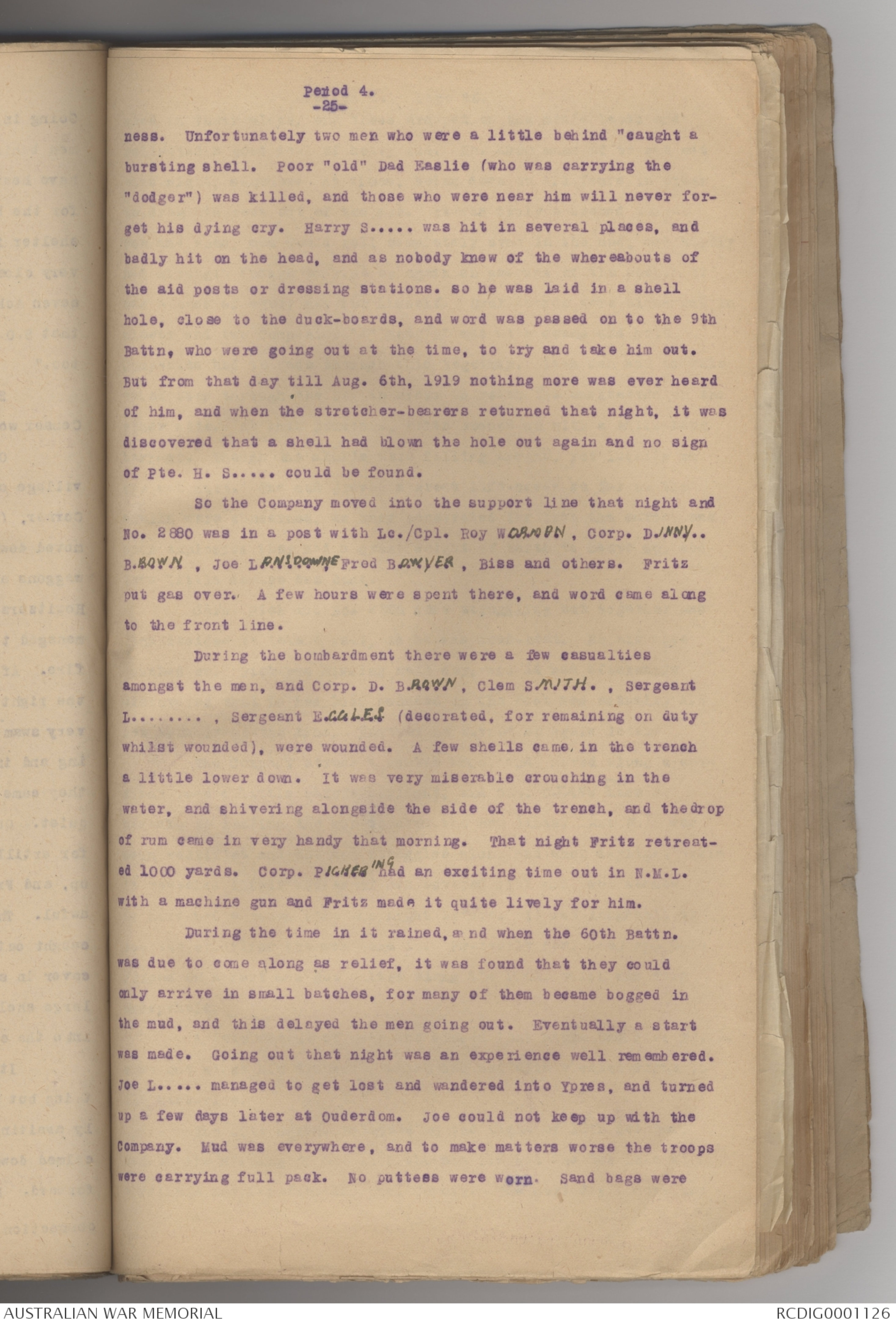
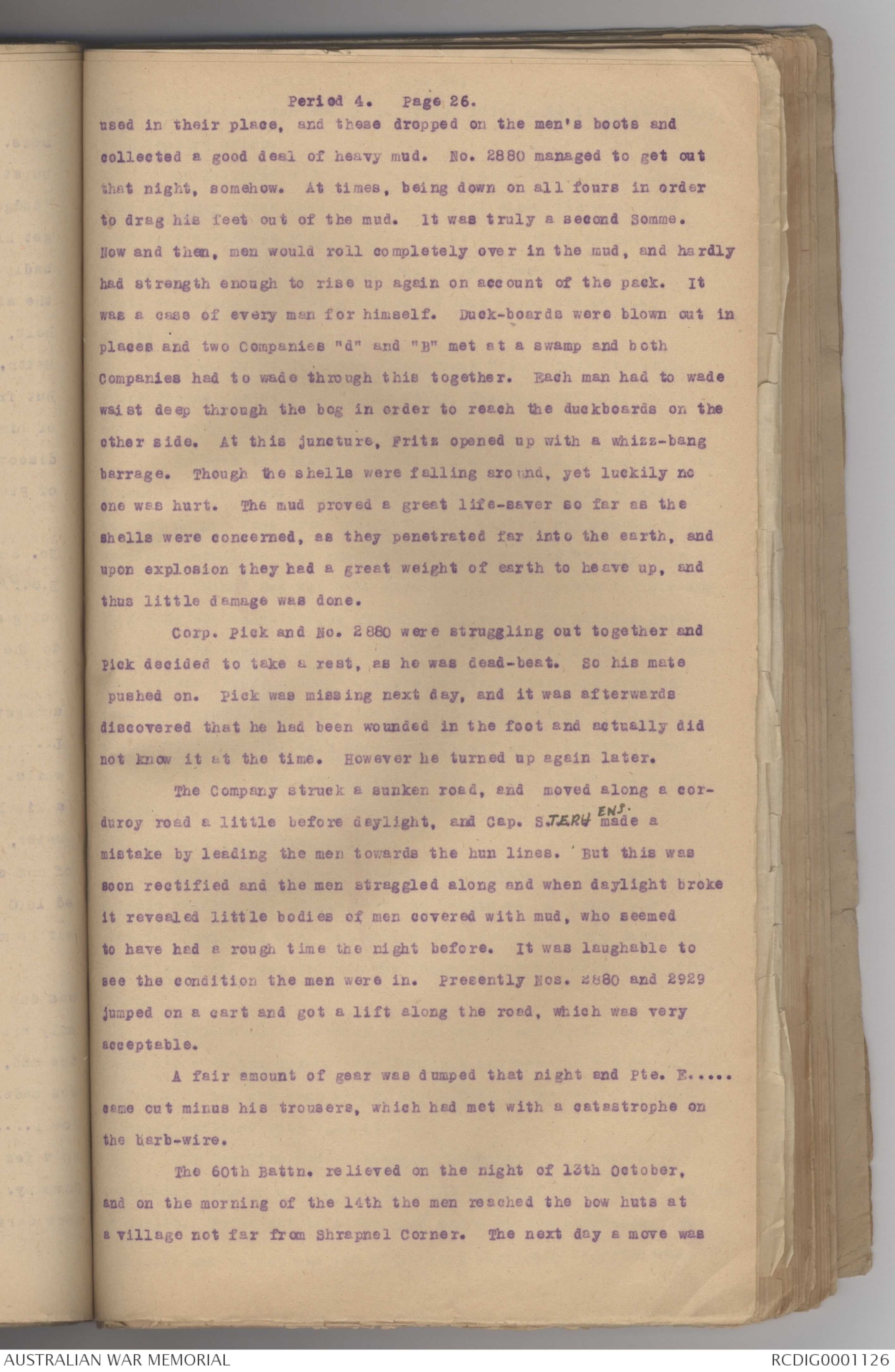
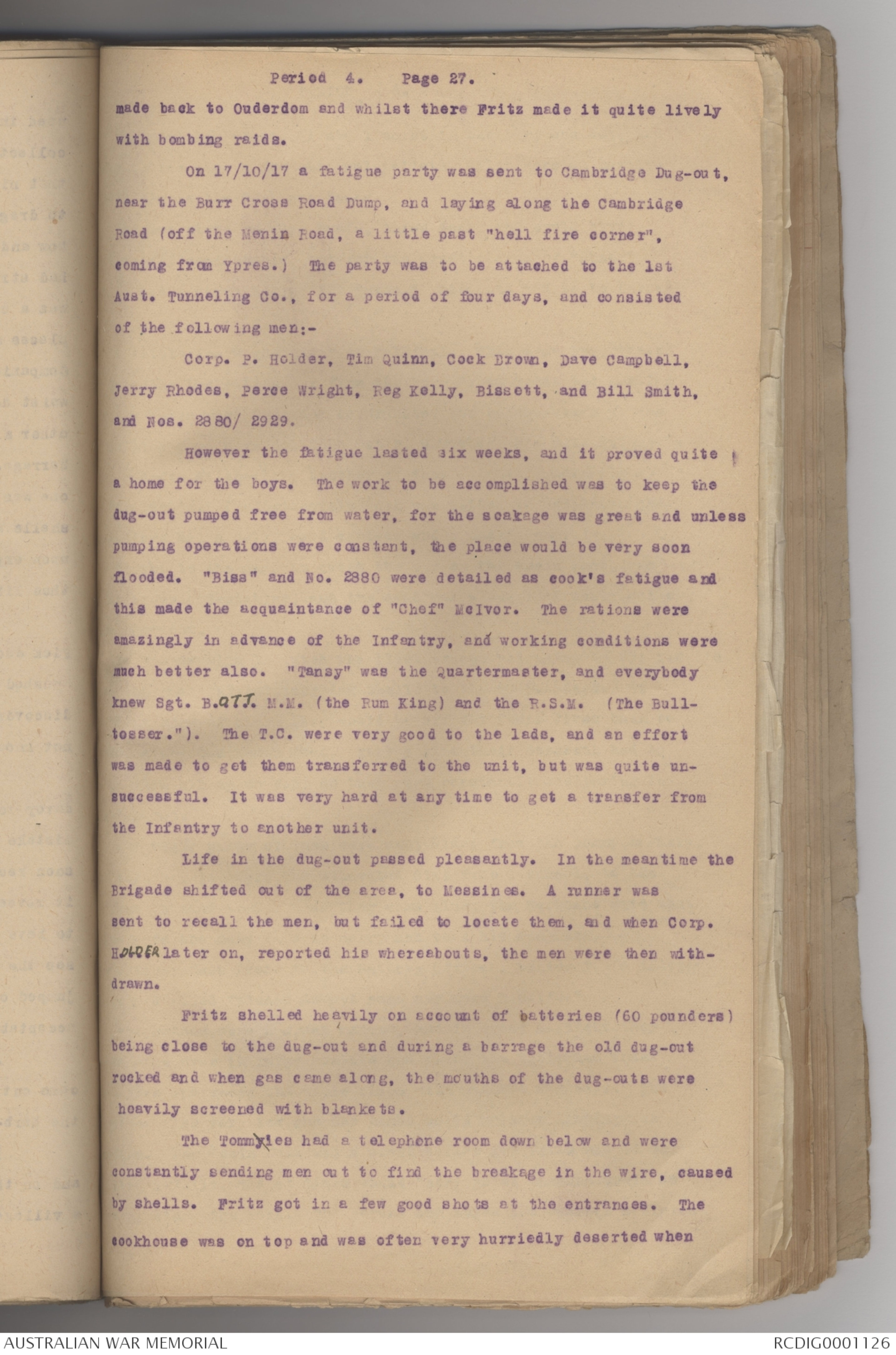
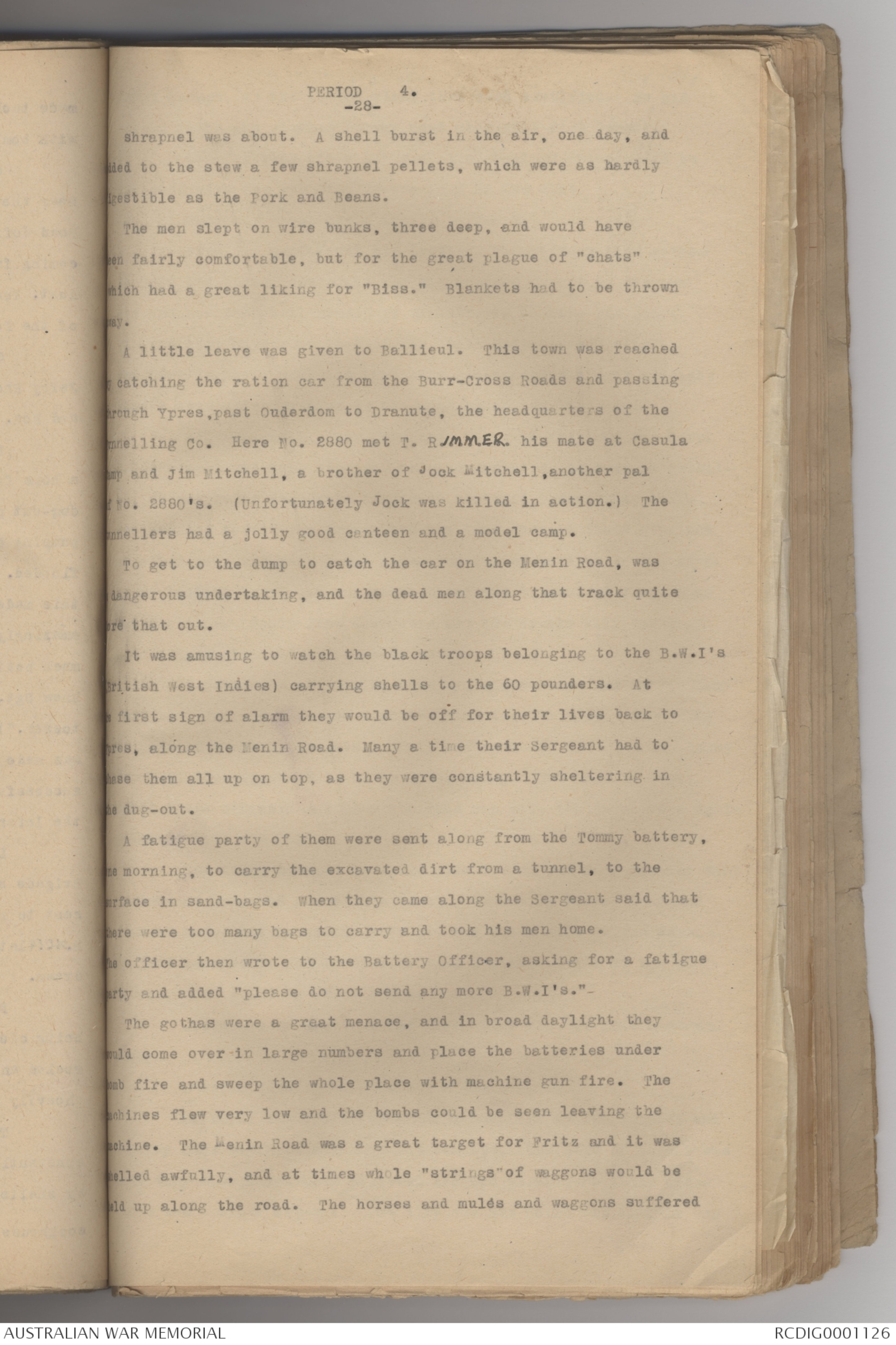
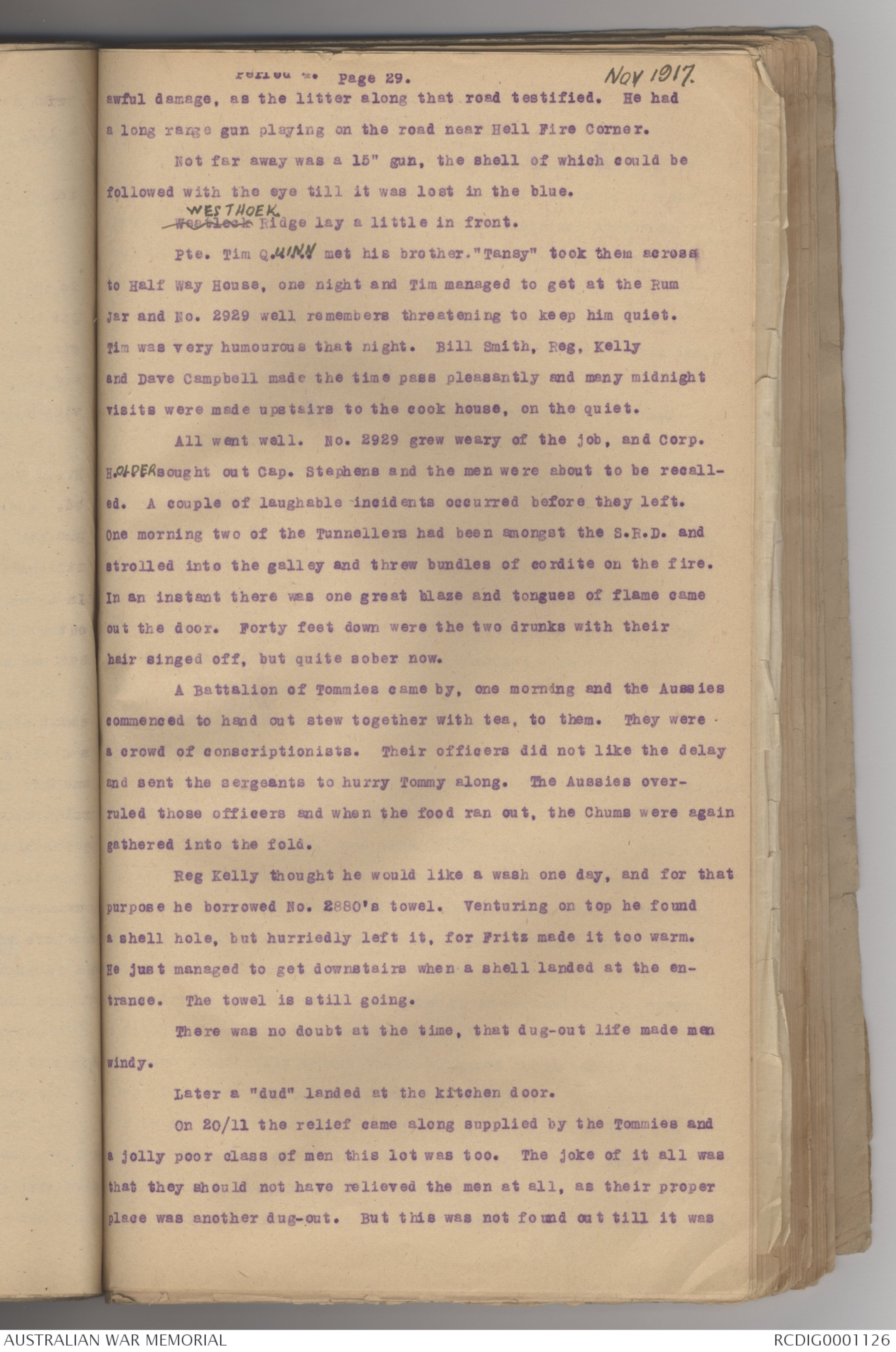
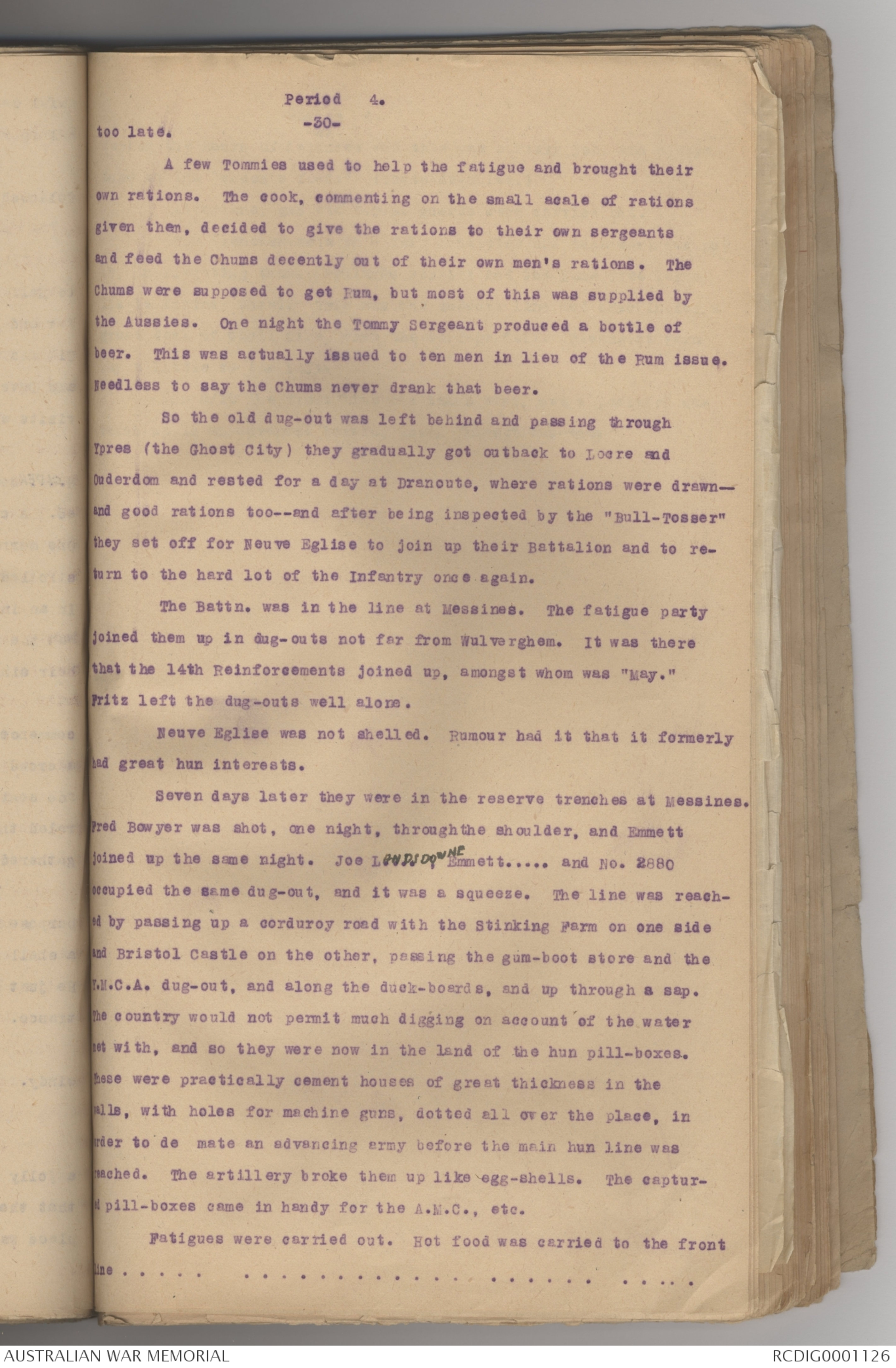
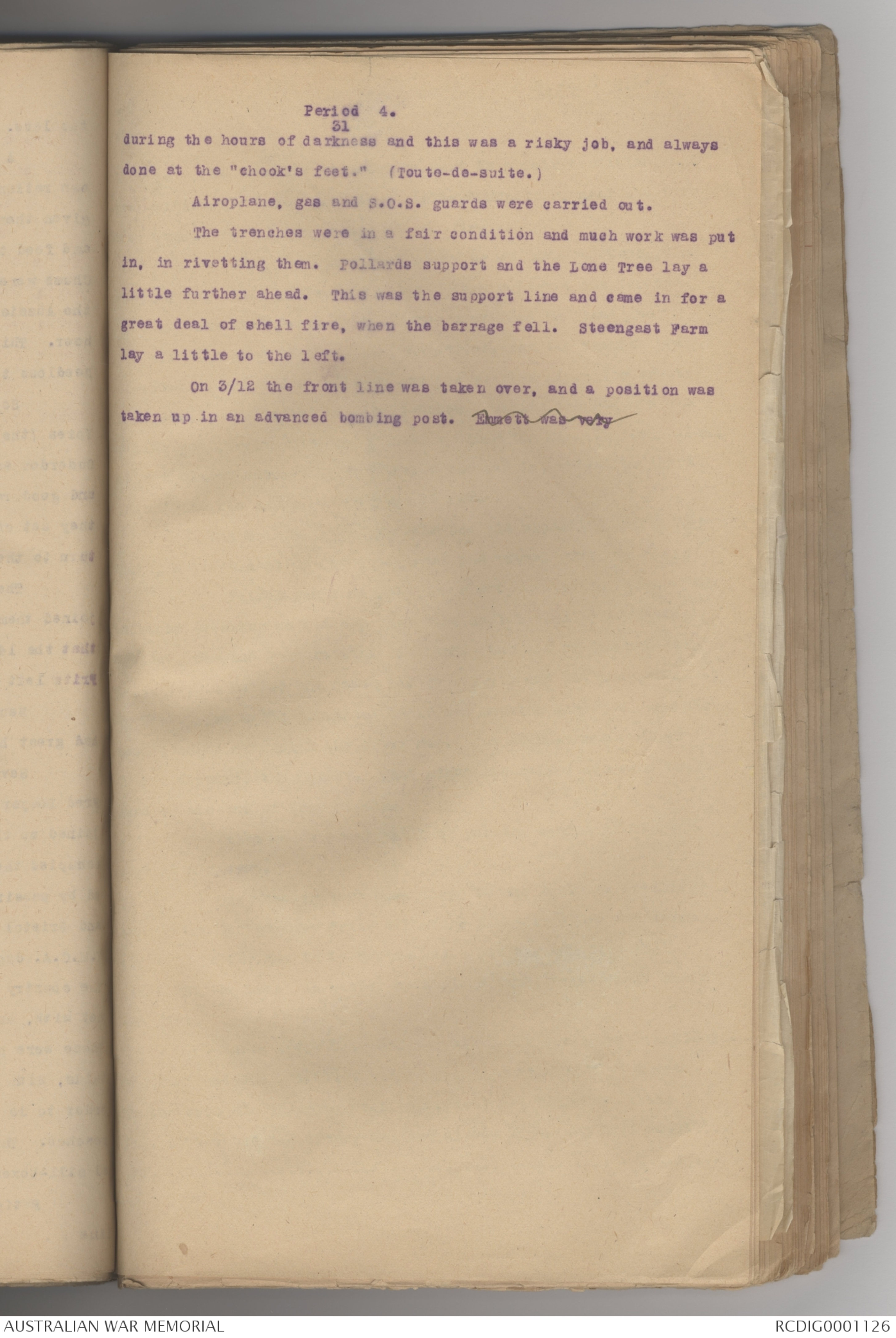
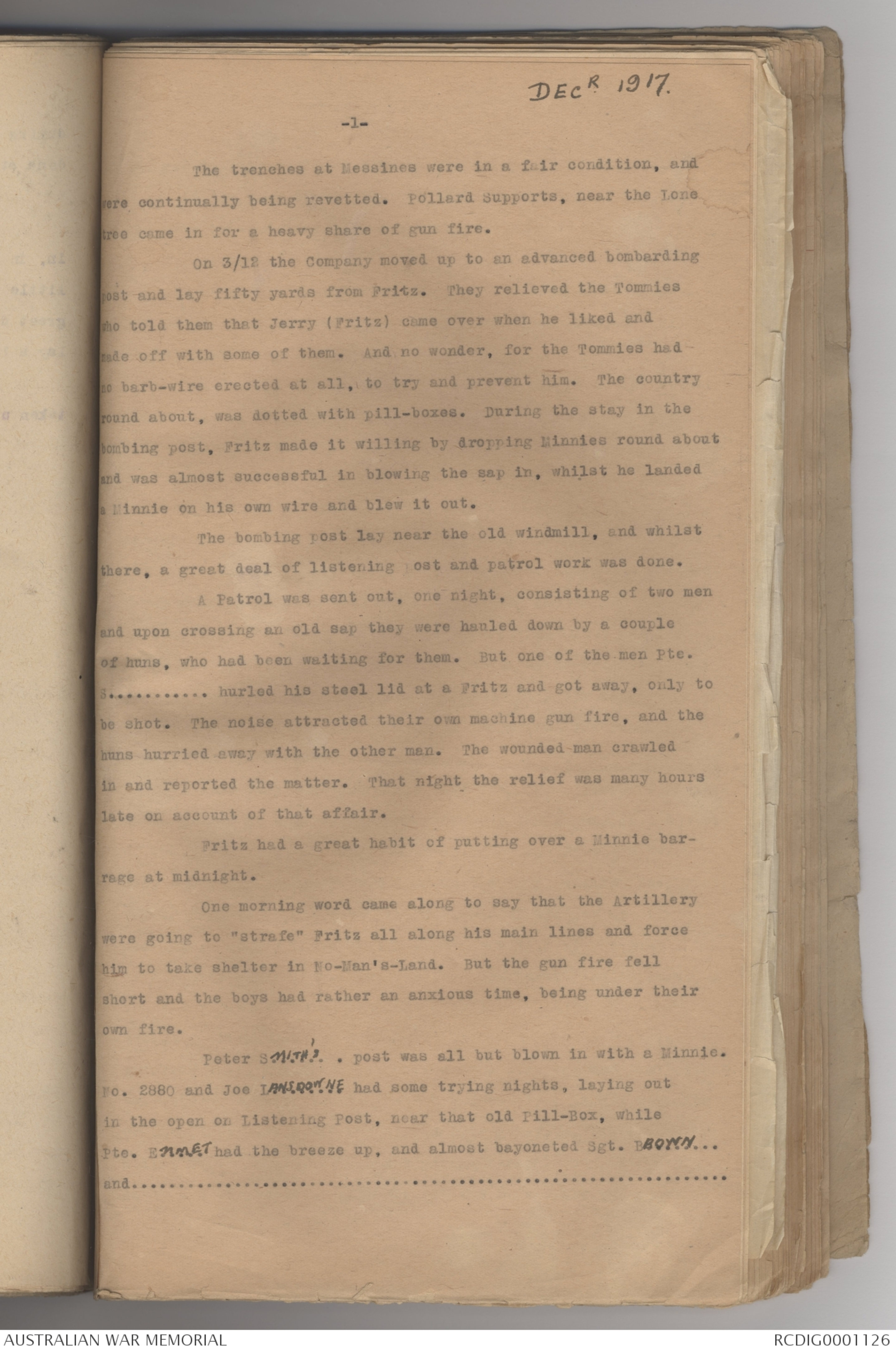
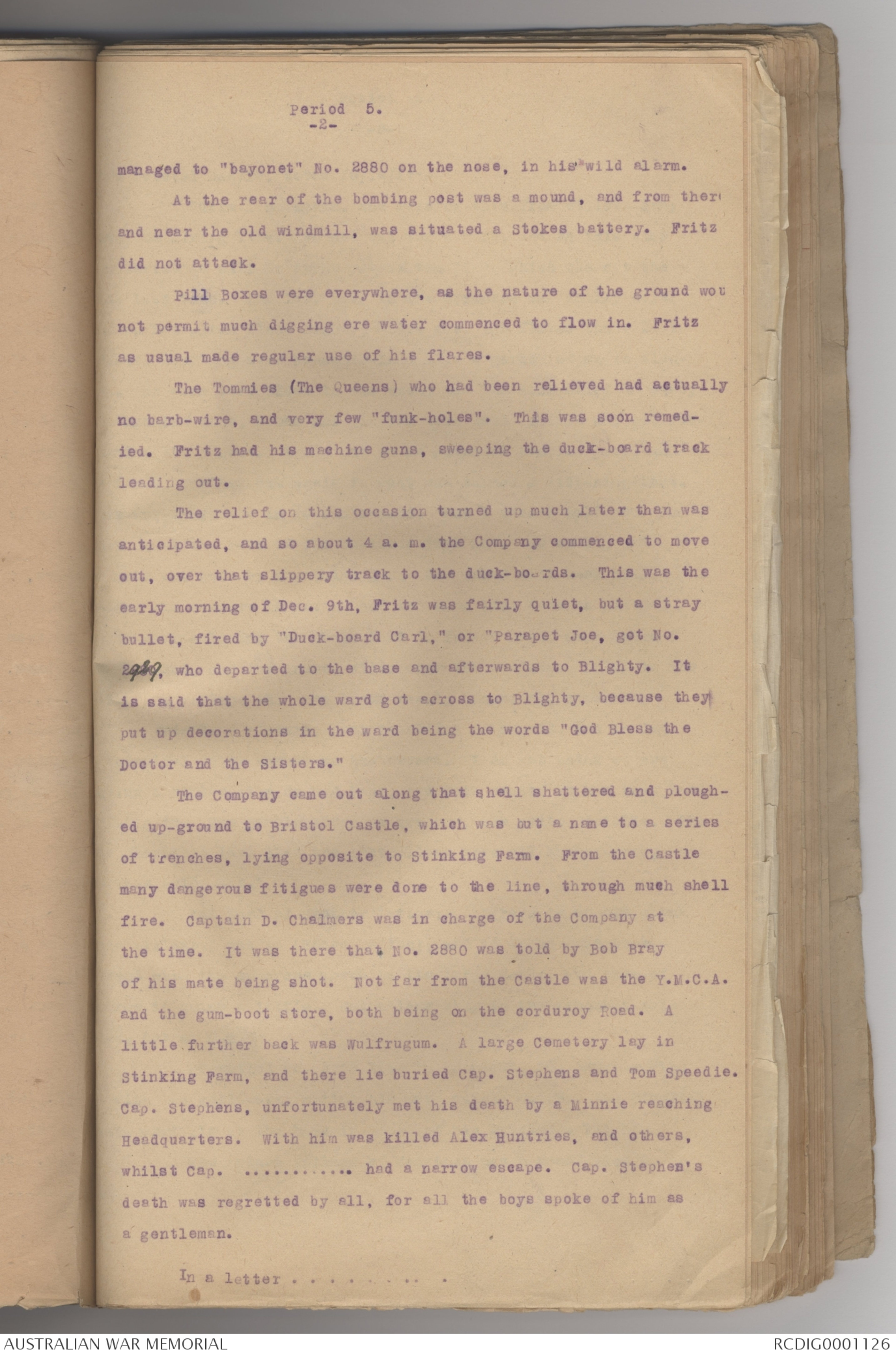
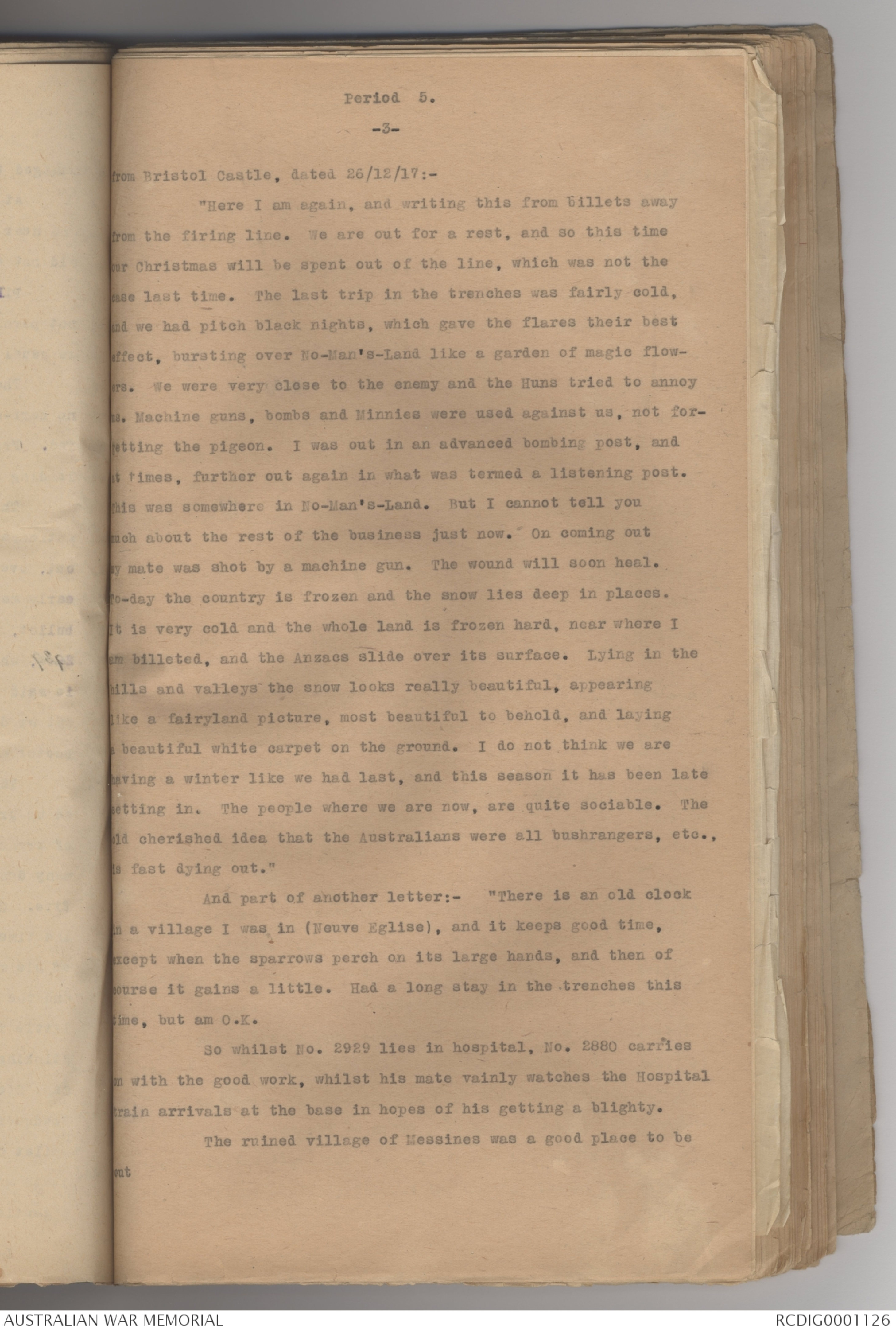
Period 4.
-25-
ness. Unfortunately two men who were a little behind "caught a
bursting shell. Poor "old" Dad Easlie (who was carrying the
"dodger") was killed, and those who were near him will never forget
his dying cry. Harry S..... was hit in several places, and
badly hit on the head, and as nobody knew of the whereabouts of
the aid posts or dressing stations. so he was laid in a shell
hole, close to the duck-boards, and word was passed on to the 9th
Battn, who were going out at the time, to try and take him out.
But from that day till Aug. 6th, 1919 nothing more was ever heard
of him, and when the stretcher-bearers returned that night, it was
discovered that a shell had blown the hole out again and no sign
of Pte. H. S..... could be found.
So the Company moved into the support line that night and
No. 2880 was in a post with Le./Cpl. Roy WORAN, Corp. DINNY..
BROWN, Joe LANSDOWNE Fred BOWYER, Biss and others. Fritz
put gas over. A few hours were spent there, and word came along
to the front line.
During the bombardment there were a few casualties
amongst the men, and Corp. D. BROWN, Clem SMITH, Sergeant
L........, Sergeant EGGLES (decorated, for remaining on duty
whilst wounded), were wounded. A few shells came in the trench
a little lower down. It was very miserable crouching in the
water, and shivering alongside the side of the trench, and the drop
of rum came in very handy that morning. That night Fritz retreated
1000 yards. Corp. PICKERING had an exciting time out in N.M.L.
with a machine gun and Fritz made it quite lively for him.
During the time in it rained, and when the 60th Battn.
was due to come along as relief, it was found that they could
only arrive in small batches, for many of them became bogged in
the mud, and this delayed the men going out. Eventually a start
was made. Going out that night was an experience well remembered.
Joe L..... managed to get lost and wandered into Ypres, and turned
up a few days later at Ouderdom. Joe could not keep up with the
Company. Mud was everywhere, and to make matters worse the troops
were carrying full pack. No puttees were worn. Sand bags were
Period 4. Page 26.
used in their place, and these dropped on the men's boots and
collected a good deal of heavy mud. No. 2880 managed to get out
that night, somehow. At times, being down on all fours in order
to drag his feet out of the mud. It was truly a second Somme.
Now and then, men would roll completely over in the mud, and hardly
had strength enough to rise up again on account of the pack. It
was a case of every man for himself. Duck-boards were blown out in
places and two Companies "d" and "B" met at a swamp and both
companies had to wade through this together. Each man had to wade
waist deep through the bog in order to reach the duckboards on the
other side. At this juncture, Fritz opened up with a whizz-bang
barrage. Though the shells were falling around, yet luckily no
one was hurt. The mud proved a great life-saver so far as the
shells were concerned, as they penetrated far into the earth, and
upon explosion they had a great weight of earth to heave up, and
thus little damage was done.
Corp. Pick and No. 2880 were struggling out together and
Pick decided to take a rest, as he was dead-beat. So his mate
pushed on. Pick was missing next day, and it was afterwards
discovered that he had been wounded in the foot and actually did
not know it at the time. However he turned up again later.
The Company struck a sunken road, and moved along a corduroy
road a little before daylight, and Cap. STEPHENS made a
mistake by leading the men towards the hun lines. But this was
soon rectified and the men straggled along and when daylight broke
it revealed little bodies of men covered with mud, who seemed
to have had a rough time the night before. It was laughable to
see the condition the men were in. Presently Nos. 2880 and 2929
jumped on a cart and got a lift along the road, which was very
acceptable.
A fair amount of gear was dumped that night and Pte. E.....
came out minus his trousers, which had met with a catastrophe on
the barb-wire.
The 60th Battn. relieved on the night of 13th October,
and on the morning of the 14th the men reached the bow huts at
a village not far from Shrapnel Corner. The next day a move was
Period 4. Page 27.
made back to Ouderdom and whilst there Fritz made it quite lively
with bombing raids.
On 17/10/17 a fatigue party was sent to Cambridge Dug-out,
near the Burr Cross Road Dump, and laying along the Cambridge
Road (off the Menin Road, a little past "hell fire corner"
coming from Ypres.) The party was to be attached to the 1st
Aust. Tunneling Co., for a period of four days, and consisted
of the following men:-
Corp. P. Holder, Tim Quinn, Cock Brown, Dave Campbell,
Jerry Rhodes, Perce Wright, Reg Kelly, Bissett, and Bill Smith,
and Nos. 2880/ 2929.
However the fatigue lasted six weeks, and it proved quite
a home for the boys. The work to be accomplished was to keep the
dug-out pumped free from water, for the soakage was great and unless
pumping operations were constant, the place would be very soon
flooded. "Biss" and No. 2880 were detailed as cook's fatigue and
this made the acquaintance of "Chef" McIvor. The rations were
amazingly in advance of the Infantry, and working conditions were
much better also. "Tansy" was the Quartermaster, and everybody
knew Sgt. BOTT M.M. (the Rum King) and the R.S.M. (The Bulltosser.").
The T.C. were very good to the lads, and an effort
was made to get them transferred to the unit, but was quite unsuccessful.
It was very hard at any time to get a transfer from
the Infantry to another unit.
Life in the dug out passed pleasantly. In the meantime the
Brigade shifted out of the area, to Messines. A runner was
sent to recall the men, but failed to locate them, and when Corp.
HOLDER later on, reported his whereabouts, the men were then withfrawn.
Fritz shelled heavily on account of batteries (60 pounders)
being close to the dug-out and during a barrage the old dug-out
rocked and when gas came along, the mouths of the dug-outs were
heavily screened with blankets.
The Tommyies had a telephone room down below and were
constantly sending men out to find the breakage in the wire, caused
by shells. Fritz got in a few good shots at the entrances. The
cookhouse was on top and was often very hurriedly deserted when
PERIOD 4.
-28-
shrapnel was about. A shell burst in the air, one day, and
added to the stew a few shrapnel pellets, which were as hardly
digestible as the Pork and Beans.
The men slept on wire bunks, three deep, and would have
been fairly comfortable, but for the great plague of "chats"
which had a great liking for "Biss." Blankets had to be thrown
away.
A little leave was given to Ballieul. This town was reached
by catching the ration car from the Burr-Cross Roads and passing
through Ypres ,past Ouderdom to Dranute, the headquarters of the
tunnelling Co. Here No. 2880 met T. RIMMER. his mate at Casula
camp and Jim Mitchell, a brother of Jock Mitchell ,another pal
of No. 2880's. (Unfortunately Jock was killed in action.) The
tunnellers had a jolly good canteen and a model camp.
To get to the dump to catch the car on the Menin Road, was
a dangerous undertaking, and the dead men along that track quite
bore that out.
It was amusing to watch the black troops belonging to the B.W.I's
(British West Indies) carrying shells to the 60 pounders. At
the first sign of alarm they would be off for their lives back to
Ypres, along the Menin Road. Many a time their Sergeant had to
chase them all up on top, as they were constantly sheltering in
the dug-out.
A fatigue party of them were sent along from the Tommy battery,
one morning, to carry the excavated dirt from a tunnel, to the
surface in sand-bags. When they came along the Sergeant said that
there were too many bags to carry and took his men home.
The officer then wrote to the Battery Officer, asking for a fatigue
party and added "please do not send any more B.W.I's."
The gothas were a great menace, and in broad daylight they
would come over in large numbers and place the batteries under
bomb fire and sweep the whole place with machine gun fire. The
machines flew very low and the bombs could be seen leaving the
machine. The Menin Road was a great target for Fritz and it was
shelled awfully, and at times whole "strings"of waggons would be
held up along the road. The horses and mules and waggons suffered
Period 4. Page 29.
Nov 1917.
awful damage, as the litter along that road testified. He had
a long range gun playing on the road near Hell Fire Corner.
Not far away was a 15" gun, the shell of which could be
followed with the eye till it was lost in the blue.Weatleck WESTHOEK Ridge lay a little in front.
Pte. Tim QUINN met his brother. "Tansy" took them across
to Half Way House, one night and Tim managed to get at the Rum
jar and No. 2929 well remembers threatening to keep him quiet.
Tim was very humourous that night. Bill Smith, Reg, Kelly
and Dave Campbell made the time pass pleasantly and many midnight
visits were made upstairs to the cook house, on the quiet.
All went well. No. 2929 grew weary of the job, and Corp.
HOLDER sought out Cap. Stephens and the men were about to be recall1ed.
A couple of laughable incidents occurred before they left.
One morning two of the Tunnellers had been amongst the S.R.D. and
strolled into the galley and threw bundles of cordite on the fire.
In an instant there was one great blaze and tongues of flame came
out the door. Forty feet down were the two drunks with their
hair singed off, but quite sober now.
A Battalion of Tommies came by, one morning and the Aussies
commenced to hand out stew together with tea, to them. They were
a crowd of conscriptionists. Their officers did not like the delay
and sent the sergeants to hurry Tommy along. The Aussies over-ruled
those officers and when the food ran out, the Chums were again
gathered into the fold.
Reg Kelly thought he would like a wash one day, and for that
purpose he borrowed No. 2880's towel. Venturing on top he found
a shell hole, but hurriedly left it, for Fritz made it too warm.
He just managed to get downstairs when a shell landed at the entrance.
The towel is still going.
There was no doubt at the time, that dug out life made men
windy.
Later a "dud" landed at the kitchen door.
On 20/11 the relief came along supplied by the Tommies and
a jolly poor class of men this lot was too. The joke of it all was
that they should not have relieved the men at all, as their proper
place was another dug-out. But this was not found out till it was
Period 4.
-30-
too late.
A few Tommies used to help the fatigue and brought their
own rations. The cook, commenting on the small scale of rations
given them, decided to give the rations to their own sergeants
and feed the Chums decently out of their own men's rations. The
Chums were supposed to get Rum, but most of this was supplied by
the Aussies. One night the Tommy Sergeant produced a bottle of
beer. This was actually issued to ten men in lieu of the Rum issue.
Needless to say the Chums never drank that beer.
So the old dug-out was left behind and passing through
Ypres (the Ghost City) they gradually got outback to Locre and
Ouderdom and rested for a day at Dranoute, where rations were drawn-
and good rations too--and after being inspected by the "Bull-Tosser"
they set off for Neuve Eglise to join up their Battalion and to return
to the hard lot of the Infantry once again.
The Battn. was in the line at Messines. The fatigue party
joined them up in dug-outs not far from Wulverghem. It was there
that the 14th Reinforcements joined up, amongst whom was "May."
Fritz left the dug-outs well alone.
Neuve Eglise was not shelled. Rumour had it that it formerly
had great hun interests.
Seven days later they were in the reserve trenches at Messines.
Fred Bowyer was shot, one night, through the shoulder, and Emmett
joined up the same night. Joe LANDSDOWNE Emmett..... and No. 2880
occupied the same dug-out, and it was a squeeze. The line was reached
by passing up a corduroy road with the Stinking Farm on one side
and Bristol Castle on the other, passing the gum-boot store and the
Y.M.C.A. dug-out, and along the duck-boards, and up through a sap.
The country would not permit much digging on account of the water
e with, and so they were now in the land of the hun pill-boxes.
These were practically cement houses of great thickness in the
walls, with holes for machine guns, dotted all over the place, in
order to de mate an advancing army before the main hun line was
reached. The artillery broke them up like egg-shells. The captured
pill-boxes came in handy for the A.M.C., etc.
Fatigues were carried out. Hot food was carried to the front
line
Period 4.
31
during the hours of darkness and this was a risky job, and always
done at the "chook's feet." (Toute-de-suite.)
Airoplane, gas and S.O.S. guards were carried out.
The trenches were in a fair condition and much work was put
in, in rivetting them. Pollards support and the Lone Tree lay a
little further ahead. This was the support line and came in for a
great deal of shell fire, when the barrage fell. Steengast Farm
lay a little to the left.
On 3/12 the front line was taken over, and a position was
taken up in an advanced bombing post. Emmett was very
DECR 1917.
-1-
The trenches at Messines were in a fair condition, and
were continually being revetted. Pollard Supports, near the Lone
tree came in for a heavy share of gun fire.
On 3/12 the Company moved up to an advanced bombarding
post and lay fifty yards from Fritz. They relieved the Tommies
who told them that Jerry (Fritz) came over when he liked and
made off with some of them. And no wonder, for the Tommies had
no barb-wire erected at all, to try and prevent him. The country
round about, was dotted with pill-boxes. During the stay in the
bombing post. Fritz made it willing by dropping Minnies round about
and was almost successful in blowing the sap in, whilst he landed
a Minnie on his own wire and blew it out.
The bombing post lay near the old windmill, and whilst
there, a great deal of listening post and patrol work was done.
A Patrol was sent out, one night, consisting of two men
and upon crossing an old sap they were hauled down by a couple
of huns, who had been waiting for them. But one of the men Pte.
S........... hurled his steel lid at a Fritz and got away, only to
be shot. The noise attracted their own machine gun fire, and the
huns hurried away with the other man. The wounded man crawled
in and reported the matter. That night the relief was many hours
late on account of that affair.
Fritz had a great habit of putting over a Minnie barrage
at midnight.
One morning word came along to say that the Artillery
were going to "strafe" Fritz all along his main lines and force
him to take shelter in No-Man's-Land. But the gun fire fell
short and the boys had rather an anxious time, being under their
own fire.
Peter SMITH'S. post was all but blown in with a Minnie.
No. 2880 and Joe LANSDOWNE had some trying nights, laying out
in the open on Listening Post, noar that old Pill-Box, while
Pte. EMMET had the breeze up, and almost bayoneted Sgt. BROWN
and
Period 5.
-2-
managed to "bayonet" No. 2880 on the nose, in his wild alarm.
At the rear of the bombing post was a mound, and from there
and near the old windmill, was situated a Stokes battery. Fritz
did not attack.
Pill Boxes were everywhere, as the nature of the ground wou
not permit much digging ere water commenced to flow in. Fritz
as usual made regular use of his flares.
The Tommies (The Queens) who had been relieved had actually
no barb-wire, and very few "funk-holes". This was soon remedied.
Fritz had his machine guns, sweeping the duck-board track
leading out.
The relief on this occasion turned up much later than was
anticipated, and so about 4 a. m. the Company commenced to move
out, over that slippery track to the duck-boards. This was the
early morning of Dec. 9th, Fritz was fairly quiet, but a stray
bullet, fired by "Duck-board Carl," or "Parapet Joe, got No.
2929 who departed to the base and afterwards to Blighty. It
is said that the whole ward got across to Blighty, because they
put up decorations in the ward being the words "God Bless the
Doctor and the Sisters."
The Company came out along that shell shattered and ploughed
up-ground to Bristol Castle, which was but a name to a series
of trenches, lying opposite to Stinking Farm. From the Castle
many dangerous fitigues were done to the line, through much shell
fire. Captain D. Chalmers was in charge of the company at
the time. It was there that No. 2880 was told by Bob Bray
of his mate being shot. Not far from the Castle was the Y.M.C.A.
and the gum-boot store, both being on the corduroy Road. A
little further back was Wulfrugum. A large Cemetery lay in
Stinking Farm, and there lie buried Cap. Stephens and Tom Speedie.
Cap. Stephens, unfortunately met his death by a Minnie reaching
Headquarters. With him was killed Alex Huntries, and others,
whilst Cap. ............ had a narrow escape. Cap. Stephen's
death was regretted by all, for all the boys spoke of him as
a gentleman.
In a letter ....
Period 5.
-3-
From Bristol Castle, dated 26/12/17:-
"Here I am again, and writing this from billets away
from the firing line. We are out for a rest, and so this time
our Christmas will be spent out of the line, which was not the
case last time. The last trip in the trenches was fairly cold,
and we had pitch black nights, which gave the flares their best
effect, bursting over No-Man's-Land like a garden of magic flowers.
We were very close to the enemy and the Huns tried to annoy
us. Machine guns, bombs and Minnies were used against us, not forgetting
the pigeon. I was out in an advanced bombing post, and
at times, further out again in what was termed a listening post.
This was somewhere in No-Man's-Land. But I cannot tell you
much about the rest of the business just now. On coming out
my mate was shot by a machine gun. The wound will soon heal.
To-day the country is frozen and the snow lies deep in places.
It is very cold and the whole land is frozen hard, near where I
am billeted, and the Anzacs slide over its surface. Lying in the
hills and valleys the snow looks really beautiful, appearing
like a fairyland picture, most beautiful to behold, and laying
a beautiful white carpet on the ground. I do not think we are
having a winter like we had last, and this season it has been late
getting in. The people where we are now, are quite sociable. The
old cherished idea that the Australians were all bushrangers, etc.,
fast dying out."
And part of another letter:- "There is an old clock
in a village I was in (Neuve Eglise), and it keeps good time,
except when the sparrows perch on its large hands, and then of
course it gains a little. Had a long stay in the trenches this
time, but am O.K.
So whilst No. 2929 lies in hospital, No. 2880 carries
on with the good work, whilst his mate vainly watches the Hospital
train arrivals at the base in hopes of his getting a blighty.
The ruined village of Messines was a good place to be
out
 Kate Benn
Kate BennThis transcription item is now locked to you for editing. To release the lock either Save your changes or Cancel.
This lock will be automatically released after 60 minutes of inactivity.